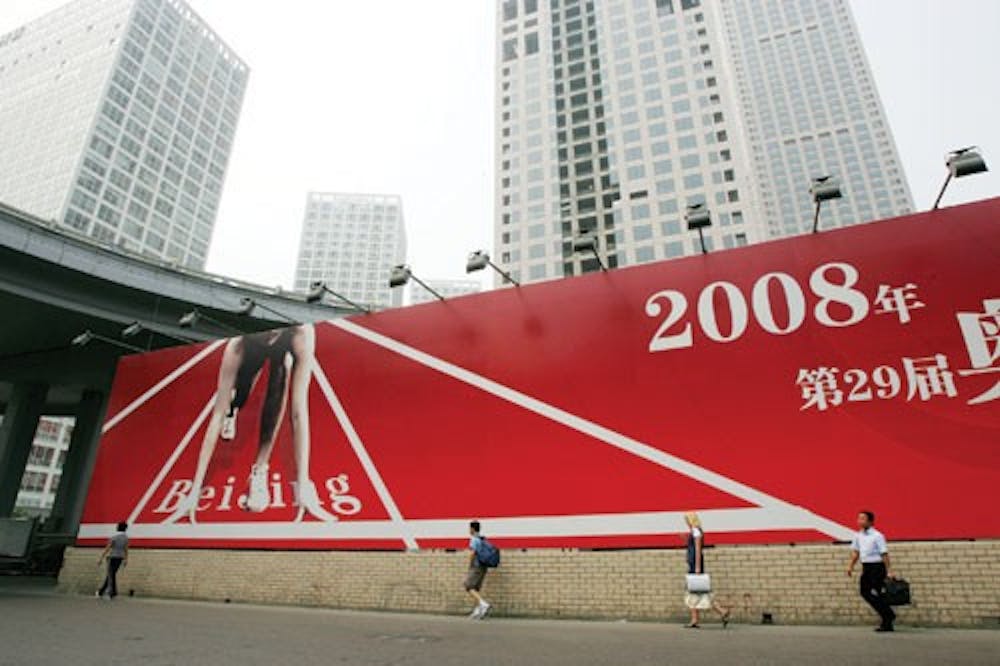BEIJING – Despite a persistent gray haze, officials said Tuesday an exercise that removed more than 1 million private vehicles a day from Beijing’s gridlocked streets was a success that could mean a clearer sky during next summer’s Olympics.\nHumidity and wind conditions kept the pollution from dispersing, but the air during the four-day drill would have been much worse without the vehicle restrictions, said Du Shaozhong, the deputy director of the Chinese capital’s Environmental Protection Bureau.\n“The test was successful. These four days the wind speed was slow, while the humidity and temperature were high,” Du told reporters, noting that a gray sky doesn’t necessarily mean pollution is bad.\nAir pollution has emerged as a key problem for Beijing as it gears up for the Olympics, to be held Aug. 8-24, 2008. Jammed traffic and the possibility of political protests by critics of the communist regime are also concerns, although venue construction is firmly on schedule.\nInternational Olympic Committee President Jacques Rogge warned during a visit this month that the competition schedule might have to be juggled on days when pollution was particularly bad.\nThe government’s own statistics showed that the air quality during the test rated among the top 10 worst days of the month so far – and slightly worse than the same period a year ago.\nThe traffic ban removed 1.3 million private vehicles from the capital’s perpetually gridlocked streets each day. Additional buses and subways were added as residents turned to public transportation, car pools and taxis.\nCars with even-numbered license plates were ordered off roads Friday and Sunday, and vehicles with odd-numbered plates were banned Saturday and Monday. Emergency vehicles, taxis, buses and other public-service vehicles were exempt.\nBeijing had an air pollution index of between 93 and 95 during the test days, the city’s environmental protection bureau said on its Web site. According to the State Environmental Protection Agency, an index below 100 indicates excellent or good conditions.\n“As the air quality during these four days reached the national standard, it was fit for all activities, including sports,” Du said.\nThe index hit 116 Tuesday after the test and was 115 on Aug. 16 – the day before the trial began, the Chinese statistics showed.\nOfficials said a reading of between 101 to 200 indicates slight pollution and people with heart and respiratory conditions are told to avoid exertion and outdoor activities.\nEarlier in the month, the pollution index had dipped as low as 42 and generally hovered in the 70s or 80s in the first two weeks of August.\nChris Miller, director of the global warming campaign at Greenpeace, said the car ban was a step in the right direction for China, but he doubted whether it showed any real commitment to improving air quality.\n“This is a short-term solution to what is a very acute and long-term problem. In some ways it just highlights how serious the problem really is,” he said.\n“They will probably be able to get air pollution to at least semi-acceptable levels for a couple of weeks at Olympics sites in and around Beijing, but the question is why can’t they then figure out how to make that happen every day?” Miller said.\nBeijing residents praised the traffic controls, saying they were necessary to ease gridlock. Zhai Shuanghe, an official with the city traffic management bureau, said average traffic speeds on main roads rose just over 53 percent, to about 27 mph.\n“I thought it was very good. There was an immediate effect on the traffic,” said a woman who gave her surname as Li. She said she usually drives two to three times a week.\nA cab driver, who gave his surname as Wang, said his business did not increase significantly, but he thinks the controls should be in place beyond the Olympics.\n“I think it’s good to regulate by license plate number. I think they should do it long-term, so there’s no congestion,” he said.\nTraffic controls are just one way Olympics organizers have tried to clear the skies. Officials have spent billions of dollars closing factories and moving others out of the city. Frenzied, around-the-clock construction to modernize Beijing will be curtailed ahead of the games next summer.\nBeijing is particularly focused on combating particle pollution, which can cause breathing problems and reduced visibility. That pollution is caused by emissions from power plants, diesel engines and wind-blown dust. High ozone levels, which occur on sunny days when nitrogen oxides and hydrocarbons emitted by car tailpipes, power plants and factories react in the air, are also a problem.\nZhai said the restrictions were widely respected, with only 5,648 cars found in violation.\n“It demonstrates the great consciousness and civilization of Beijing citizens,” he said.
Air pollution plaguing Beijing ahead of Olympics
Officials say new measures are cleaning host city

Get stories like this in your inbox
Subscribe





